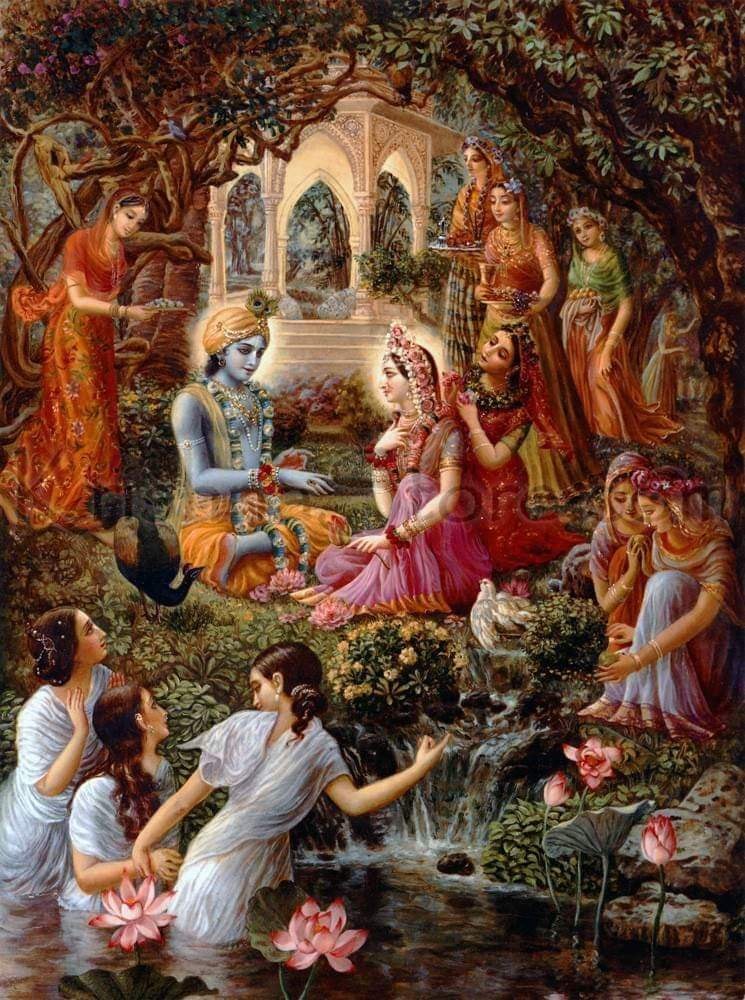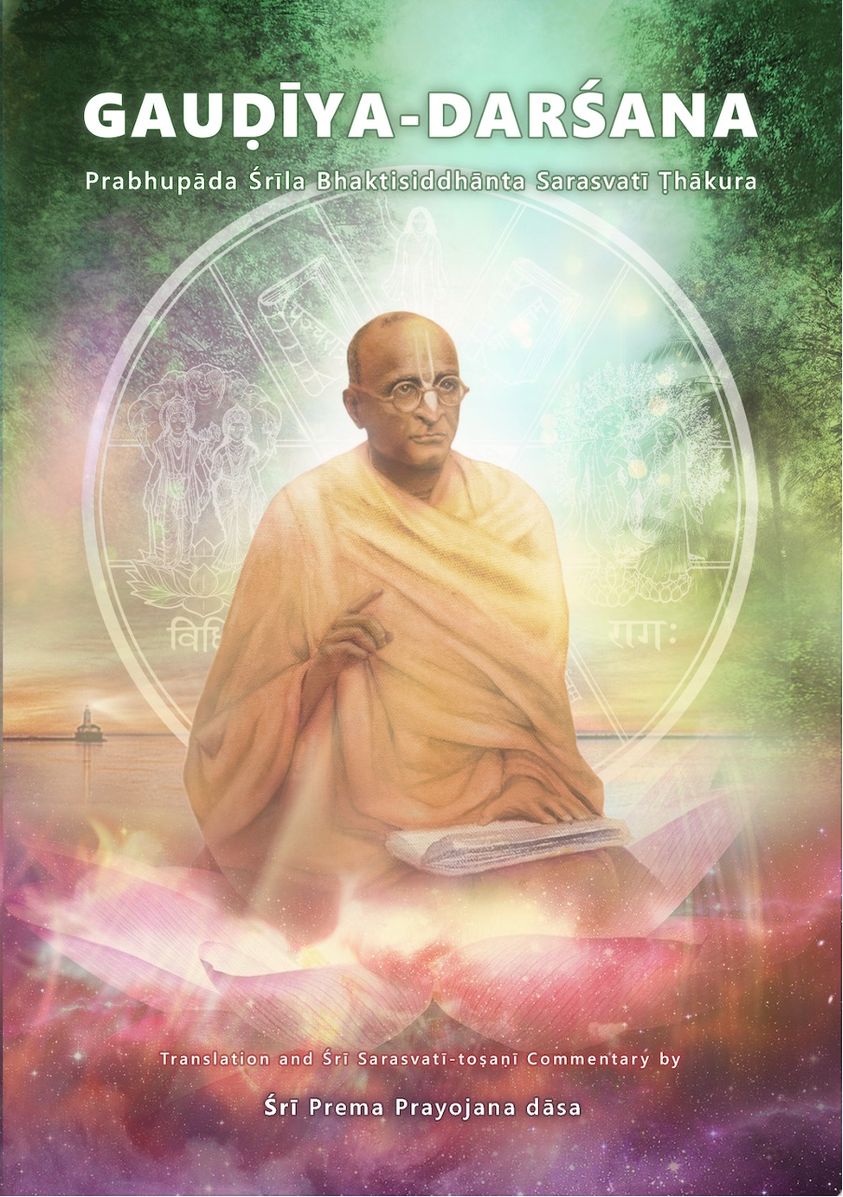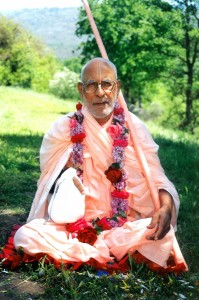
Tridandisvami Sri Srimad Bhaktivedanta Narayana Maharaja
The Song of Krishna’s Flute
Srimad-Bhagavatam
Tenth Canto – chapter twenty-one
The gopis sing the glories of
the sound of Sri Krishna’s flute as
He enters the enchanting forest
of Vrindavana upon the arrival of autumn
Venu Gita audio classes by BV Tridandi Swami
Introduction to the Venu-Gita by Srila Bhaktivedanta Narayana Goswami Maharaja
Srimad-Bhagavatam is a direct manifestation of the
Supreme Lord. It is an ambrosial, overflowing ocean of
supremely sweet nectarean love.
(prema-rasa) for the original
Supreme Personality of Godhead (Svayam Bhagavan), that is,
Vrajendra-nandana Sri Krishna, the personification of divine
mellows. Rasika and bhavuka devotees (1) absorbed in tasting
the beauty of Krishna’s pastimes, always drown in this ocean.
Srimad-Bhagavatam is the fully ripened, juicy fruit of the
desire tree of Vedic literature that comprises the entirety of
Indian thought. Within Srimad-Bhagavatam, gopi-prema, the
love of the cowherd maidens of Vraja, has been ascertained to
be the ultimate objective.
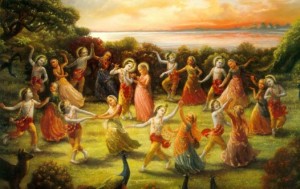
The Rasa Dance
A few towering waves of gopi-prema can be seen from the
Venu-gita portion of Srimad-Bhagavatam. Rasika devotees,
who are seasoned in experiencing divine loving sentiments,
drown themselves in these waves and even lose all
consciousness of their own bodies. Greed to be immersed in
this ambrosial ocean sprouts also in the hearts of the faithful
devotees who are situated on the shore of this ocean.
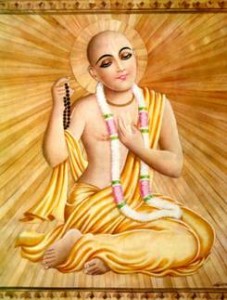
Lord Chaitanya Mahaprabhu
Sri Caitanya Mahaprabhu, the combined form of rasaraja
(the King of divine mellows) and mahabhava (the Queen
of divine love), resplendent with the sentiment and bodily
complexion of Sri Radha, relished the nectar of Venu-gita
with Sri Svarupa Damodara and Sri Raya Ramananda in
Sri Gambhira. Srila Sanatana Gosvami and Srila Jiva Gosvami
collected a few drops of this nectar in their commentaries
1 Devotees immersed in upper stages of bhakti and expert in tasting
transcendental mellows
on Srimad-Bhagavatam, entitled Brihad-vaishnava-toshani
and Laghu-vaishnava-toshani respectively. Srila Visvanatha
Cakravarti Thakura, through his commentary named
Sarartha-darsini, has distributed to the whole world that same
nectar in the form of remnants of their mahaprasada.
Some persons believe that unqualified sadhakas (spiritual
practitioners) are ineligible to hear, chant or remember the
topics of Sri Venu-gita, Sri Rasa-pancadhyayi, Yugala-gita,
Bhramara-gita and so on, as described in the Tenth Canto of
Srimad-Bhagavatam. This consideration is fully legitimate.
But according to their conception, only a sadhaka who has
conquered the six urges (lust, anger, etc.), who is free from
all anarthas (mean, selfish propensities) and fully purified of
the heart disease of lust is eligible to hear such topics, while
all others have no right. We will now examine this topic in
greater detail.
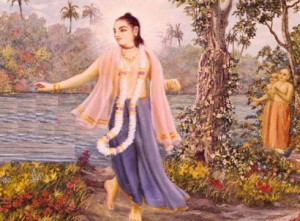
Lord Nityananda
Srila Rupa Gosvami, who established and fulfilled the
inner heart’s desire of Sri Caitanya Mahaprabhu, composed
Sri Bhakti-rasamrita-sindhu, Sri Ujjvala-nilamani and other
sacred texts. Srila Krishnadasa Kaviraja Gosvami composed
Sri Caitanya-caritamrita. While writing, they were deeply
concerned that these confidential texts on rasa (transcendental
loving exchanges) should not fall into the hands
of unqualified persons. If this should occur, it could
present a great disturbance to the world. A glimpse of this
topic is found in Sri Caitanya-caritamrita (Adi-lila 4.231),
as stated by Srila Krishnadasa Kaviraja Gosvami:
e saba siddhanta gudha – kahite na yuyaya
na kahile, keha ihara anta nahi paya
ataeva kahi kichu karina nigudha
bujhibe rasika bhakta, na bujhibe mudha
hridaye dharaye ye caitanya-nityananda
e-saba siddhante sei paibe ananda
e saba siddhanta haya amrera pallava
bhakta-gana-kokilera sarvada vallabha
abhakta-ushtrera ithe na haya pravesa
tabe citte haya mora ananda-visesha
ye lagi kahite bhaya, se yadi na jane
iha vai kiba sukha ache tribhuvane
ataeva bhakta-gane kari namaskara
nihsanke kahiye, tara hauk camatkara
“The esoteric and confidential conclusions regarding
the amorous pastimes of rasaraja Sri Krishna with the gopis
(the cowherd maidens of Vraja who embody the highest
sentiments of divine love) are not fit to be disclosed to
the common ordinary man. But without revealing them,
no one can enter into this topic. I shall, therefore, describe
these topics in a concealed manner so that only rasika
devotees will be able to understand, whereas ineligible
fools will not.
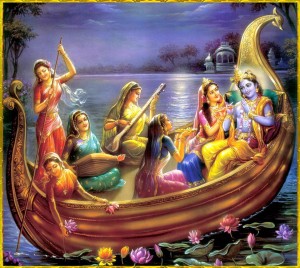
The Supreme Lord Is A Person Who Eternally Performs Beautiful Pastimes In His Own Abode Goloka Vrindavan
“Anyone who has established Sri Caitanya Mahaprabhu
and Sri Nityananda Prabhu in his heart will attain
transcendental bliss by hearing all these conclusions.
This entire doctrine is as sweet as newly grown mango
sprouts, which can be relished only by devotees, who are
likened to cuckoo birds. For the camel-like non-devotees,
there is no possibility of admittance into these topics.
Therefore, there is special jubilation in my heart. If those
whom I fear are themselves unable to comprehend these
topics, then what could be a greater source of happiness in
all the three worlds? Therefore, after offering obeisances
to the devotees, I am revealing this subject without any
hesitation.”
By reading and hearing these topics, everyone can attain
the highest benefit. Srila Krishnadasa Kaviraja Gosvami
has clarified this topic by quoting the following verse from
Srimad-Bhagavatam (10.33.36):
anugrahaya bhaktanam manusham deham asthitah
bhajate tadrisih krida yah srutva tat-paro bhavet
“In order to bestow mercy upon the devotees as well
as the conditioned souls, Bhagavan Sri Krishna manifests
His human-like form and performs such extraordinary
pastimes (rasa-lila) that anyone who hears them becomes
exclusively devoted unto Him.” (quoted in Caitanyacaritamrita,
Adi-lila 4.34).
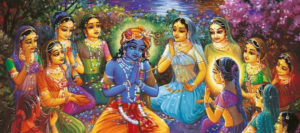
Here Krishnadasa Kaviraja points out that the verb bhavet
in this verse is in the imperative mood. This means it is
compulsory to hear such pastimes, as explained in the
following verse from Caitanya-caritamrita (Adi-lila 4.35):
‘bhavet’ kriya vidhilin, sei iha kaya
kartavya avasya ei, anyatha pratyavaya
“In this verse bhavet is in the imperative mood.
Therefore, this certainly must be done. To not do so would
be a discrepancy.”
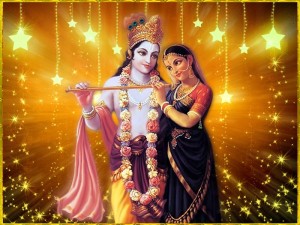
Sri Sri Radha and Krishna
For the information of the reader, I am referring here
to Srila Jiva Gosvami’s Vaishnava-toshani commentary on the
above quoted Srimad-Bhagavatam verse (10.33.36). The words
“anugrahaya bhaktanam manusham deham asthitah” indicate
that the Supreme Lord Sri Krishna appears in His original
human-like form and performs various pastimes in order
to bestow favor upon His devotees. Therefore, although
Sri Krishna is satisfied in Himself (apta-kama), His display of
kindness toward the devotees is quite appropriate. This is the
distinctive characteristic of visuddha-sattva (pure spiritual
goodness). The Lord is always prepared to reward the devotees
with a result consistent with their performance of bhajana
(worshipful service). The favor shown toward King Rahugana
by Sri Jada Bharata and the Lord’s favor toward Sukadeva
Gosvami illustrate this.
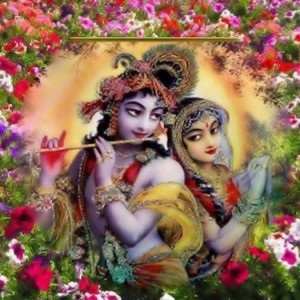
Sri Sri Radha and Krishna The Divine Couple
In the verse under discussion, it is said that the Lord
manifests His form and pastimes in order to bestow favour upon
His devotees. The word bhakta (devotee) used here refers to the
vraja-devis (the gopis), the Vrajavasis (the residents of Vraja)
and all other Vaishnavas – past, present and future. In order to
bestow favor upon the vraja-devis, the Supreme Godhead Sri
Krishna lovingly engages in such pastimes as purva-raga (the
loving attachment experienced in anticipation of meeting
Krishna). To bestow mercy upon all the residents of Vraja, He
enacts His birth and other pastimes, and by all His activities
He bestows favour upon past, present and future devotees
through the medium of hearing narrations of His divine
pastimes.
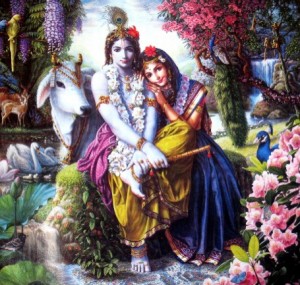
Radha and Krishna
Sri Krishna manifests all these pastimes to benefit the
devotees. By doing so, even ordinary persons (other than
the devotees) who hear even the more common of the Lord’s
pastimes become fully intent on the Lord. Therefore, by
hearing the supremely ambrosial rasa-lila, Sri Krishna’s circle
dance with millions of gopis, such persons will certainly
become exclusively devoted to the Lord – of this there can
be no doubt. This fact will be elaborately discussed in subsequent
verses, such as vikriditam vraja-vadhubhir idam ca
vishnoh (Srimad-Bhagavatam 10.33.39).
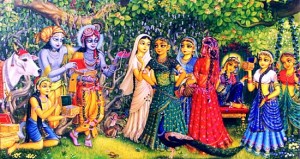
The words manusham deham asthitah may also indicate that
those jivas who have attained the human form of life are able
to hear all these pastimes, and thus they become exclusively
devoted to the Supreme Lord. This is so because the Lord
incarnates exclusively on the earthly planets, and it is here
only that worship of the Lord takes on its predominant form.
Consequently, the human beings residing on the earthly
planets may easily hear these narrations of the Lord’s pastimes.
We find the word bhaktanam (for the devotees) in this verse,
but in some other editions, the word bhutanam (for all living
entities) is found in its place.In the first case, the purport is
that the Lord incarnates only for the sake of the devotees,
who are thus the root cause of the Lord’s appearance. But the
Lord also appears in His original human-like form in order
to bestow His favour upon the liberated souls, the aspirants
for liberation, sense enjoyers, and all other living entities
in accordance with their relationship with His devotees.
The Lord’s compassion is therefore said to be the cause of
His appearance. Nevertheless, it must be understood that the
Lord’s favour toward other living entities is due only to their
relationship with His devotees.

In his Bhagavatam commentary known as Bhavarthadipika,
Srila Sridhara Svami has written that, what to speak of
the devotees, even materialistic persons are freed from their
material absorption by hearing the Lord’s pastimes, and thus
they become exclusively fixed upon Him.
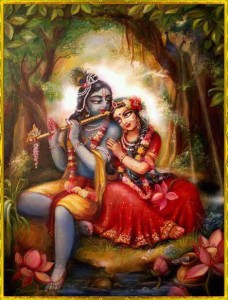
Srila Visvanatha Cakravarti Thakura explains this verse
in his commentary known as Sarartha-darsini: “The Lord
performs varieties of pastimes to show favor to His devotees.
Coming in the human form of life, living entities who hear
these pastimes become exclusively devoted unto the Lord.
In other words, they develop firm faith in hearing the
narrations of the Lord’s activities. What more shall I say about
the importance of hearing about Krishna’s pastimes ? And this
rasa-lila, being fully imbued with madhurya-rasa (the mellow
of amorous love), is eminently distinguished even from the
Lord’s other pastimes. Like a jewel, a mantra or a powerful
medicine, this rasa-lila is endowed with such indisputable,
astonishing potency that by hearing it, all persons in the
human form become devoted to the Supreme Lord. Therefore,
all varieties of devotees who hear the descriptions of these
pastimes will become successful and obtain supreme pleasure.
Can there be any doubt about this?”
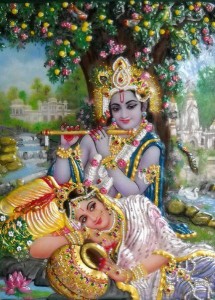
Also, we may cite verse 10.33.30 from Srimad-Bhagavatam:
naitat samacarej jatu manasapi hy anisvarah
vinasyaty acaran maudhyad yatharudro ‘bdhijam visham
“In other words, those who are not the Supreme Lord,
who are powerless and subjected to karma, should never
imitate the Lord’s pastimes even within their minds.
If anyone foolishly imitates Lord Siva by drinking the
poison generated from the ocean, he will certainly be
destroyed.”
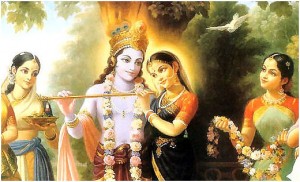
Radha And Krishna The Divine Couple
The gist of Srila Jiva Gosvami’s and Srila Visvanatha
Cakravarti Thakura’s commentaries on this verse is that
living entities who are subservient to the material body
and who are anisvara – bereft of the controlling potency of
the Supreme Lord – should never behave in such a way as
to imitate the Lord. What to speak of actually transgressing
religious codes as the Lord seems to do in His pastimes,
one should not entertain even the desire to do so.
The word samacarana (behavior), when divided into its
constituent parts (samyak and acarana), signifies complete
behaviour. Here it has been used to indicate total prohibition
of such activity. Therefore, the purport is that such
behaviourshould not be adopted even to the slightest extent.
What to speak of performing such activities through speech
or the senses, one should not even mentally conceive of such
activities for oneself.
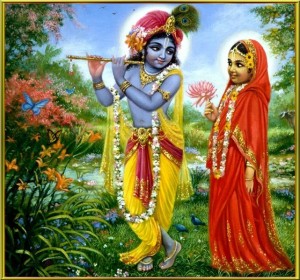
Srimati Radhika and Lord Krishna
The word hi indicates that this certainly must not be done.
If one were to behave in that way, he would be completely
destroyed. The significance of the word maudhyad (stupidity)
is that if anyone, being ignorant of the Lord’s omnipotence
and his own incompetence, foolishly adopts such behavior,
he will be utterly ruined. Just as if anyone other than Lord
Siva were to foolishly consume deadly poison, instantaneously
he would be killed. But Lord Siva, in spite of drinking poison,
is not destroyed; to the contrary, he attains even greater fame
and splendour as Nila-kantha, he whose throat turned blue
from drinking poison.
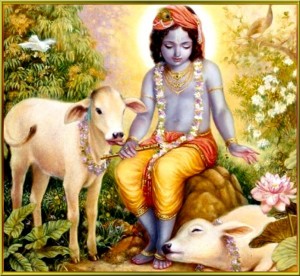
Lord Krishna
Here in this verse, imitation of such behaviour has been
prohibited, yet in the verse already cited (Srimad-Bhagavatam
10.33.36) – yah srutva tat-paro bhavet – it is evident that
not only devotees but even others who faithfully hear these
pastimes will become fully devoted to the Supreme Lord.
This has been further explained in the following verse from
Srimad-Bhagavatam (10.33.39):
vikriditam vraja-vadhubhir idam ca vishnoh
sraddhanvito ‘nusrinuyad atha varnayed yah
bhaktim param bhagavati pratilabhya kamam
hrid-rogam asv apahinoty acirena dhirah
“A sober person who in the beginning faithfully
and continuously hears from his guru the narrations of
Sri Krishna’s unprecedented rasa dance with the young
brides (gopis) of Vraja, and later describes those pastimes,
very soon attains para-bhakti, or prema-bhakti (supreme
loving devotion), for the Supreme Lord, and thus becomes
competent to quickly dispel the heart disease of lust.”
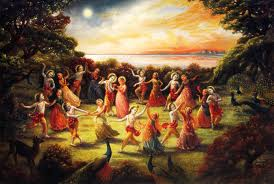
The Rasa Lila. There is not a trace of mundane material lust.
Here, Srila Jiva Gosvami comments in Vaishnava-toshani:
Having concluded the narration of the rasa-lila, Sukadeva
Gosvami became deeply immersed in spiritual ecstasy. In this
verse, he describes the fruits of hearing and chanting the
rasa-lila and thus benedicts all future listeners and reciters.
Those who incessantly and faithfully hear Krishna’s rasalila
with the young brides of Vraja, and later repeat those
pastimes, quickly attain para-bhakti toward Bhagavan
Sri Krishna and thus relinquish the heart disease of lust.”
Sraddhanvita means to hear with firm faith. This word has
been used to prevent the offense that results from mistrust
or disregard of the statements of sastra (authorized Vedic
scriptures).
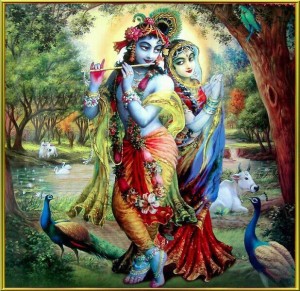
Such negative temperament is in complete
opposition to the principle of hearing with faith. It has
also been used to promote constant hearing; by its use the
importance of hearing has been pointed out. The words atha
varnayed indicate that after continuously hearing the rasa-lila
along with other special pastimes, one will personally describe
those pastimes. By indirect implication, it is further indicated
that after hearing and reciting, one will also remember those
pastimes and take great delight in them. In other words,
hearing, chanting, remembering, experiencing delight and so
on are all implied by the words sraddhanvitah anusrinuyat atha
varnayed (to hear repeatedly with faith and then describe).
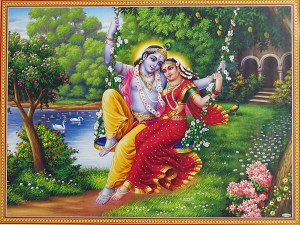
Para-bhakti (supreme devotion) means bhakti which
follows in the wake of the gopis of Vraja. Therefore, the
bhakti referred to here is prema-bhakti of the highest category.
The word pratilabhya (obtained), together with the word
para-bhakti (possessing the distinctive characteristics of
prema), indicates that first para-bhakti is obtained within the
heart, displaying all its unending varieties at every moment.
Thereafter one quickly gives up the heart disease of lust.
The difference between kama (material lust) as a disease
of the heart and kama (spiritual love) in relationship to the
Supreme Lord is made clear. These two are quite distinct from
each other.
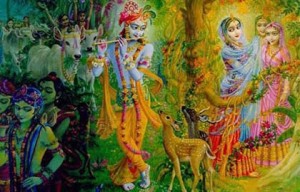
The word kama here indirectly implies that all
diseases of the heart will quickly be dispelled by spiritual love.
In Bhagavad-gita (18.54), it is said: “One who is situated
in the transcendental position beyond the contamination of
the three modes of nature, who is fully satisfied in the self,
who neither laments nor hankers for anything, and who looks
impartially upon all living beings, attains para-bhakti unto Me.”
In this verse from Gita, it is said that one attains parabhakti
only after the disappearance of the diseases of the
heart; yet in the Srimad-Bhagavatam verse quoted above, it is
said that one attains para-bhakti even before their departure.
Consequently, it is understood that hearing and chanting of
rasa-lila is one of the most powerful forms of spiritual practice.
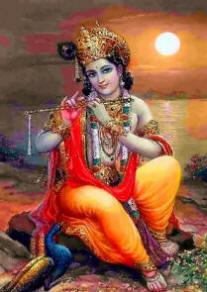
Srila Visvanatha Cakravarti Thakura discusses the
same verse (10.33.39) in his Sarartha-darsini commentary:
The prefix anu (repeatedly or methodically) when applied to
srinuyat (to hear) indicates constant hearing. By continuously
hearing from the lips of the sravana-guru2 and Vaishnavas,
and thereafter reciting, narrating or describing those pastimes
in poetry of one’s own composition, one attains para-bhakti –
that bhakti which is of the nature of prema. After hearing
instructions from the sravana-guru, the person from whom
one hears about the fundamental truths of Bhagavan, a desire
may arise to engage in bhajana.
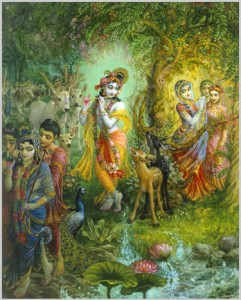
The Supreme Lord Krishna Playing His Fluite
The suffix ktva has been used in the formation of the
verb pratilabhya (obtained) in this way: prati + labh + ktva.
According to the rules of Sanskrit grammar, when the suffix
ktva is applied to a verbal root with a prefix, it is replaced
by yap. Then the letter ‘p’ is dropped and thus the final
form of the word pratilabhya is obtained. The suffix ktva
is applied to the first of two verbs performed by the same
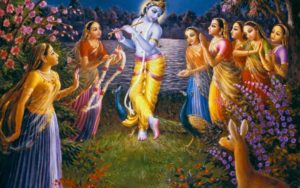
That guru from whom one hears the fundamental truths and confidential
aspects of bhakti, and who instils the desire to enter bhajana.
Often the same asthe bhajana-siksha-guru. agent to show successive
action i.e. (having attained prema, he relinquishes all lusty desires of the heart).
In this case, the first action is pratilabhya, the attainment of prema,
and the second action is apahinoti, renunciation of the lusty
desires of the heart.
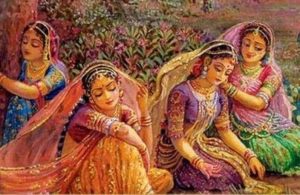
Therefore, the suffix ktva in the verb pratilabhya
indicates that although lust and other evils still remain
within the heart, prema-bhakti first enters the heart and
by its extraordinary influence destroys all vices to the root.
In other words, hearing and reciting rasa-lila possesses such
astonishing power that the lust in the heart of the faithful
sadhaka is destroyed, and he attains prema. Though these two
take place simultaneously, the influence of prema manifests
first and then, through its effect, all lusty desires of the heart
are dissipated.
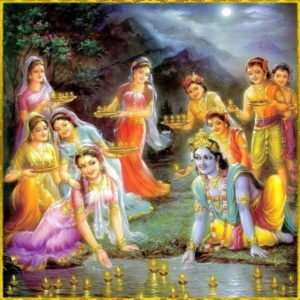
Thus, as a result of hearing and chanting the narrations
of the Lord’s pastimes, one first attains prema for the Lord’s
lotus feet and thereafter one’s heart is liberated from lusty
desires and all other contamination. Thus one becomes
perfectly pure, because prema is not feeble like the processes
of jnana (the pursuit of knowledge which leads to impersonal
liberation) and yoga. Bhakti is all-powerful and supremely
independent.
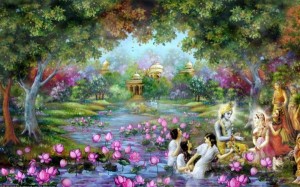
Goloka-Vrindavana, the spiritual abode of Lord Krishna.
The words hrid-roga-kama indicate the difference between
lusty desires of the heart and the kama in relationship to
the Supreme Lord. Kama which is in relationship to the
Supreme Lord is of the very nature of the nectar of prema,
whereas the lusty desires of the heart are exactly the opposite.
Therefore, these two attitudes are distinct from each other.
This is substantiated by use of the words hrid-roga-kama.
The word dhira means pandita, or one who is learned in
the scriptures. One who refuses to accept the claim of this
verse and thinks, “As long as the disease of lust remains
in the heart, prema cannot be obtained,” is said to possess
an atheistic temperament. One who is free from such a
foolish, nihilistic mentality is known as a pandita, or sober
person (dhira).
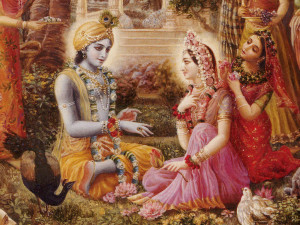
Consequently, only those who have firm faith
in the sastra are known as dhira. Those who have no faith in
the statements of the sastras are atheists and offenders to the
holy name. Such persons can never attain prema.
Consequently, in the hearts of the sadhakas who firmly
believe in the statements of the sastra, faith arises by hearing
rasa-lila and other narrations. Only in the hearts of such
faithful devotees does prema manifest its influence as a
result of hearing narrations of Krishna’s activities. Thereafter,
lust and all evils present within the hearts of the devotees are
destroyed to the root.
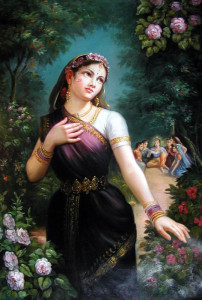
Srila Visvanatha Cakravarti Thakura’s commentary
on Srimad-Bhagavatam (10.47.59) is also relevant to this
discussion. There it is stated that bhakti is the only cause of
superior qualities found in any individual. Austerities, learning,
knowledge and so on are not the cause of superior qualities.
Although bhakti is itself of the highest excellence, it does not
appear only in the most exceptional individuals endowed with
all good qualities. On the contrary, it may manifest or remain
even in the most condemned and vile persons. Furthermore,
it causes thoroughly wretched and fallen persons to attain all
good qualities, to become worthy of the respect of all, and to
attain the highest and most rare association.
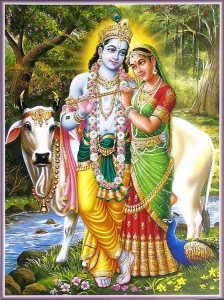
For this reason, the opinion that Bhakti-devi enters the
heart only after all base propensities and desires (anarthas),
offenses, lust and other diseases of the heart have been
eradicated is not appropriate. On the contrary, by the
mercy of the Supreme Lord or the devotees, or by faithfully
executing sadhana and bhajana (daily practices of worshiping
and meditating on the Lord to achieve love of Krishna),
this rare bhakti enters the heart first, and then all unwanted
tendencies are automatically dissipated. This conclusion is
thoroughly agreeable.
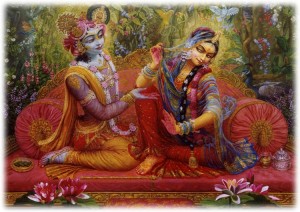
Sri Sri Radha And Krishna.
Therefore, faithful sadhakas, with firm belief in the
statements of sastra, guru and Vaishnavas, are eligible to hear
the narrations from Srimad-Bhagavatam, which are saturated
with nectar. And those who believe that only sadhakas who
are completely free from all anarthas are eligible to hear the
above-mentioned pastimes will neither become free from
anarthas nor obtain eligibility to hear – even after millions
of births.
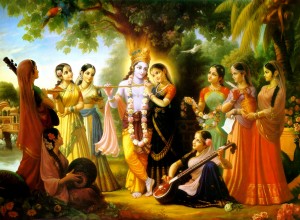
Another point to consider is that if this argument is
accepted, then we sadhakas who are still affected by anarthas,
although possessing faith, could never read or hear the sacred
books of rasika Gaudiya Vaishnava acaryas (leading spiritual
preceptors) like Srila Sanatana Gosvami, Srila Rupa Gosvami,
Srila Visvanatha Cakravarti Thakura and Srila Bhaktivinoda
Thakura. This means that we would be forever deprived of
the extremely confidential and elevated truths of bhakti
expressed by these acaryas. There would be no possibility
that the sprout of greed for raganuga-bhakti (spontaneous
devotion) would ever be awakened in our hearts. We would
be forever cheated of that which was not previously given,
the prema-rasa of the most munificent Sri Saci-nandana,
He who bestows krishna-prema. What, then, would distinguish
the Sri Gaudiya Vaishnavas who have taken shelter of
Sri Caitanya Mahaprabhu from Vaishnavas of other disciplic
lines (sampradayas)?
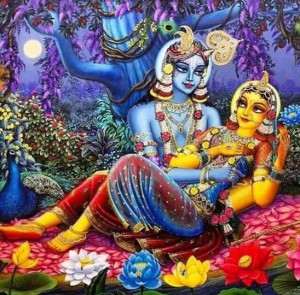
The divine couple Sri Sri Radha and Krishna
A third point to consider is this. Sri Caitanya-caritamrita
(Madhya-lila 8.70) quotes this verse from Padyavali:
krishna-bhakti-rasa-bhavita matih
kriyatam yadi kuto’pi labhyate
tatra laulyam api mulyam ekalam
janma-koti-sukritair na labhyate
Here, the words laulyam api mulyam ekalam (indeed the only
price is greed) indicate that this supremely rare greed cannot
be aroused even by pious activities accumulated over millions
and millions of births. Then how can this greed be obtained?
The words krishna-bhakti-rasa-bhavita matih indicate one
whose intelligence or perception has been awakened toward
krishna-bhakti-rasa, nectar-filled loving service to Krishna. Here,
the implication is that by faithfully hearing the narrations
of Sri Krishna’s pastimes saturated with rasa from the lips of
rasika Vaishnavas in whom krishna-bhakti-rasa has arisen, or by
faithfully and attentively studying the literatures related to
the pastimes of Sri Krishna composed by them, this greed may
be obtained. Besides this, there is no other means.
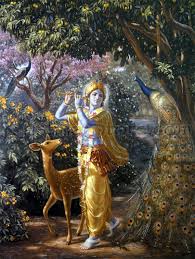
Some maintain that at present no sadhaka exists who
is completely free from anarthas and that therefore no
one is eligible, nor in the future will anyone be eligible.
This argument is completely illogical. Freedom from lust and
all other anarthas in and of itself is not the qualification
for entrance into raganuga-bhakti. On the contrary,
greed awakened towards the Lord’s madhurya (sweetness)
is the sole qualification for entrance into raganuga-bhakti.
Nor is there any certainty that by routine observance of the
limbs of vaidhi-bhakti (following rules and regulations) alone,
greed toward raganuga-bhakti will automatically awaken.
There is no evidence of this anywhere. Therefore, our highest
obligation is to follow the purport of the commentaries of the
previous acaryas to the above-mentioned verses of Srimad-
Bhagavatam.
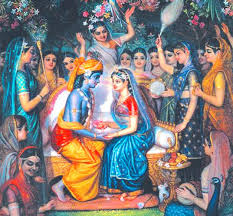
It is by the inspiration of His Divine Grace srila gurupada-
padma nitya-lila-pravishta om vishnupada ashtottara-sata
Sri Srimad Bhakti Prajnana Kesava Gosvami Maharaja and
the repeated solicitation of many bumblebee-like devotees
that I am presenting Sri Venu-gita to the readers, along with a
purport to the commentaries of Srila Cakravarti Thakura and
Srila Jiva Gosvami named Sarartha-darsini and Sri Vaishnavatoshani
respectively. By reading this subject with full faith,
the greed to enter into raganuga-bhakti will certainly sprout
in the hearts of the faithful devotees. This itself is the very
purpose of human life. Having expounded upon every point,
I end the discussion here.
Praying for a drop of mercy from Sri Guru and the
Vaishnavas,
Tridandi-bhikshu
Sri Bhaktivedanta Narayana

 Posted in
Posted in 






